Low carbon & active travel options for Oxfordshire
Developing sustainable travel options and increasing the uptake of active travel in Oxfordshire is a long-term quest. By 2030 the population of Oxfordshire is predicted to grow by 15% and there are ambitious plans to build around 100,000 new homes. The challenge of increasing traffic congestion, leading to high levels of air pollution and slow and unreliable bus journeys, needs a radical solution.
Oxfordshire County Council published their Central Oxfordshire Travel Plan, in August 2023, which sets out a vision to free up the limited road space in Central Oxfordshire to reduce the number of journeys by private cars, and make walking, cycling, public and shared transport the natural first choice.
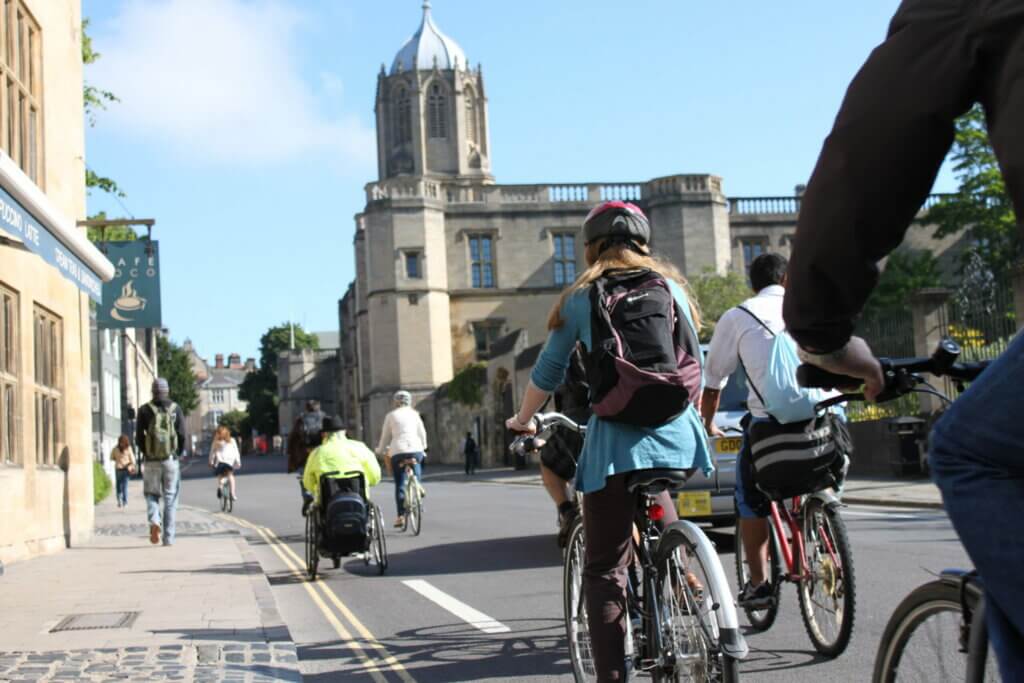
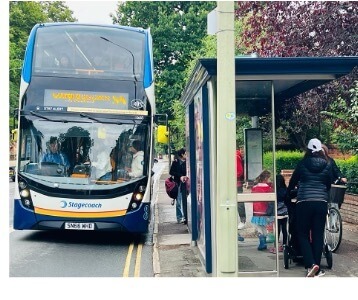
Low Carbon and active transport options for Oxfordshire emerged as the most important challenge for our community groups, at a recent Low Carbon Hub consultation event. We were delighted to respond by organising an online debate on 29 November 2023, which attracted many of our community groups and CAGs, councillors, EV car hire companies and active travel groups.
We featured four fantastic speakers who stimulated a lively discussion:
- Robin Tucker from CoHSAT
- Carey Newson from Low Carbon Oxford North on the Oxford Car Free Challenge
- Jenny Figueriedo from the Innovation Team at Oxfordshire County Council
- Zuhura Plummer, Campaign Director at Oxfordshire Liveable Streets
Robin Tucker from CoHSAT: How the journey began.
Robin’s presentation provided a warm and inspiring introduction to the meeting, by outlining how his initial love of cycling developed into a grass roots county wide movement to campaign for a cycling network. Robin was a founder member of Oxfordshire Cycling Network in 2014 and helped to develop their policy to increase the appeal of cycling, by launching a positive vision of a future Strategic Cycle Network for Oxfordshire, that could bring health and travel time benefits to the county, by linking major towns, workplaces, and transport hubs with safe, direct and attractive cycle routes.
“Our vision is that people of all abilities can choose to cycle anywhere, feeling safe and comfortable”.
Robin described how the importance of creating safe active travel across the county grew in urgency over the next few years and several smaller organisations recognised the need to work more collaboratively. In 2019 this inspired the creation of the Coalition for Healthy Streets & Active Travel campaign, that became known as CoHSAT, who found they had greater impact by working together and amplifying the voice of each member group. The group has grown to include 21 community group members, and several of their sustainable transport initiatives have been supported by Low Carbon Hub’s Community Grants Programme, including : 15 Minute Neighbourhoods, Walkability Index , School Streets and the fantastic Pop Up Shop in 2020.
Low Carbon Hub’s Community Grants Programme is open now for applications for large grants of up to £5000. If your community group has a project in mind that would lead to the reduction of energy usage or the creation of renewable energy in Oxfordshire, please check the Community Grants page on our website for more information.
Carey Newson from Low Carbon Oxford North on the Oxford Car Free Challenge
Could you leave your car behind?
That’s the question that Low Carbon Oxford North (LCON), will be asking motorists as they approach their exciting new project, the Oxford Car Free Challenge. Carey Newson explained how theproject will support individuals to experiment with taking a break from their cars for three weeks in March 2024, and to use this experience to consider a longer-term move towards more active travel, such as walking, cycling and using public transport.
The project aims to reduce car dependency by helping residents with high car usage to identify realistic alternatives to travel, in a way that is sympathetic, supportive, and positive. They will be recruiting 12 volunteer regular car drivers in December and January, across the city, who are willing to take the challenge and share their experience to encourage others to take similar steps.
LCON approached the national climate action group Possible and the Centre for Climate Change and Social Transformation (CAST)at Cardiff University for support, as they had already successfully run the initiative Car Free Cities in 2022, and most participants in that initiative found going car-free reduced their weekly travel costs, as well as their carbon emissions. LCON embarked on their own fundraising campaign last year to develop the Oxford Car Free Challenge and achieved their target of £20,000 by October 2023.
The Oxford Car Free Challenge project prompted lots of interest at the meeting, including an offer of support from an EV hire company in Banbury. If you are interesting in being a participant, you can find out more here.
Jenny Figueriedo from the Innovation Hub at Oxfordshire County Council – Accelerating the transition to electric vehicles.
Jenny is Electric Vehicle Project Manager within the Innovation Hub at Oxfordshire County Council. The team are focussing on accelerating the transition to electric and other low carbon forms of transport, including work on hydrogen and connected autonomous vehicles. Jenny’s role is mainly around planning and delivering a public EV charging infrastructure, to enable as many people as possible to switch to electric vehicles in Oxfordshire, as well looking at how we can make use of publicly available EV charging to introduce EV car clubs and reduce car ownership overall.
When it comes to living in rural Oxfordshire, where many villages have little or no public transport, car ownership and usage is unsurprisingly at a high level. Encouraging drivers to switch to driving electric cars is part of Jenny’s mission, and she described how Oxfordshire is in a leading position when it comes to Electric vehicle adoption, with 37% of the market share in the UK. She stressed the need to ensure that EV charging infrastructure not only keeps up with the demand, but also that the infrastructure is there and ready to help people to make the switch to EV’s in the first place.
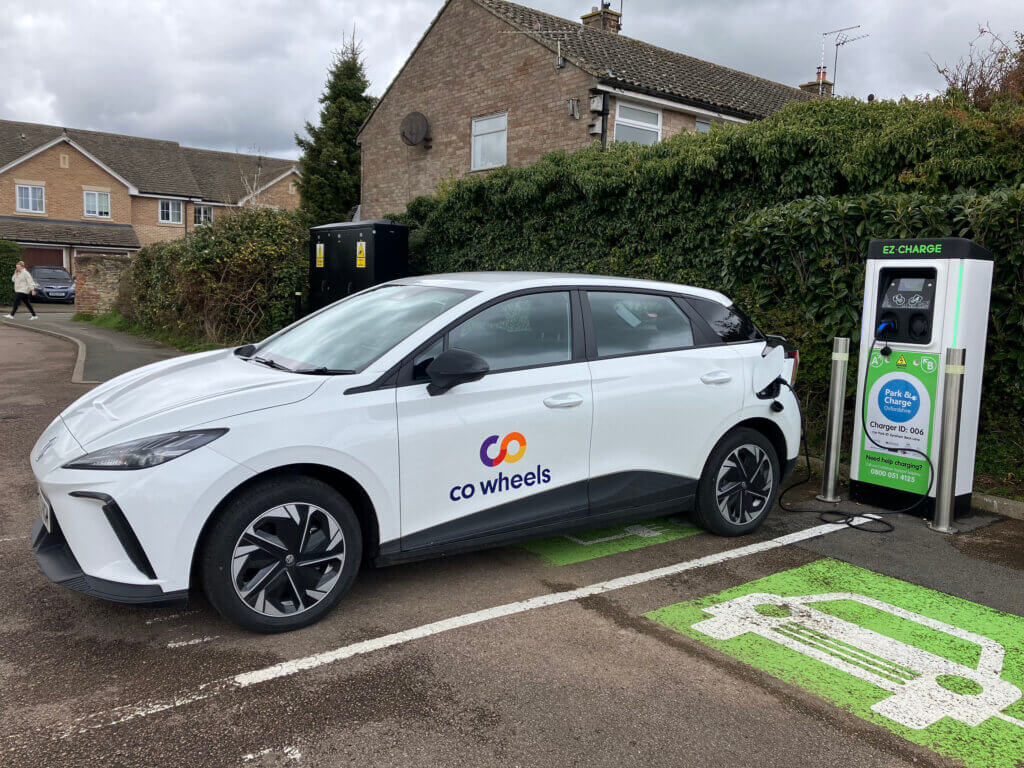
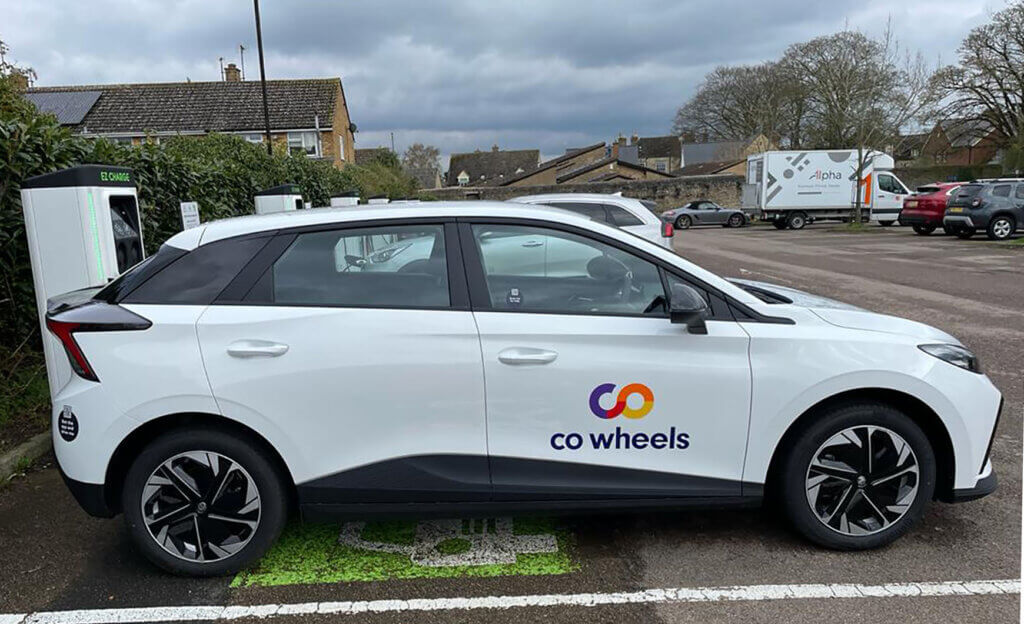

She discussed the barriers that exist to enable car owners to feel confident about switching to electric vehicles, such as the perceived lack of public EV charging points, and lack of off-street parking, with 30-40% of homes without a driveway or access to a home charger. Charging at home means that you can charge slowly (3kw) and overnight, which puts less strain on the grid.
In April this year, the Innovation Hub had spare EV chargers in the Park and Charge hubs, and launched a 12 month county-wide EV car club pilot, based at 20 Park & Charge hubs. This represented the largest single roll out of EV car club vehicles in England, outside of cities.
Jenny highlighted an exciting new development from Oxfordshire County Council, that caught the interest of all community groups present. They are planning to create EV charging ‘micro hubs’ at community buildings and car parks in rural areas in 2024. Grant funding will be available for 100 community ‘micro hubs’ to install and operate charging points for three years, and they have received over 150 expressions of interest in the scheme.
OCC have a useful online tool to track demand for EV chargers and car clubs in the county.
Zuhura Plummer, Campaign Director, Oxfordshire Liveable Streets, on The introduction of Traffic Filters.
One of the main targets of Oxfordshire County Council’s Central Oxfordshire Travel Plan (COTP), is to reduce private car journeys in Oxfordshire by a quarter by 2030. A key proposal to achieve this aim is to implement a trial of traffic filters, in Oxford in 2024, to enable buses to move more freely and cyclists to travel safely.
Support for the new measures has proved to be divisive and Zuhura Plummer, Campaign Director at Oxfordshire Liveable Streets, gave a clear and passionate presentation that helped to demystify some of the misinformation that has surrounded the traffic filter proposals. Oxfordshire Liveable Streets, established in 2018, feel strongly that providing accurate information will help people to prepare for what will be happening and understand why the trials are being brought in.
Zuhura framed her presentation by asking us to think about the problems caused by current term time traffic levels in Oxford, then to imagine the level being increased by 15% by 2030. Most of us at the meeting agreed it was a depressing image of crowded roads with high levels of traffic congestion, increased air pollution, slow journey times for buses and dangerous conditions for cycling.

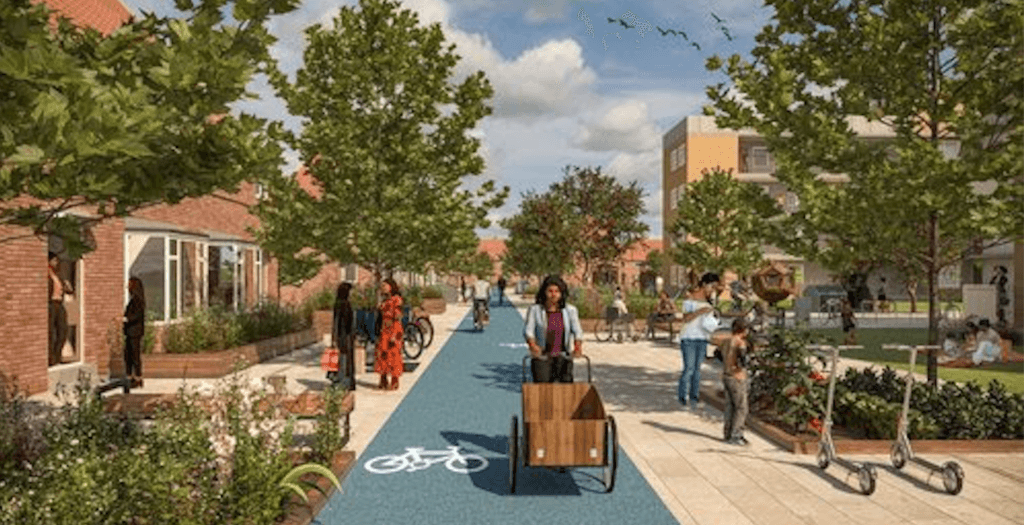
Zuhura’s quest at Oxfordshire Liveable Streets is to deliver accurate information about the COTP, which sets out a vision to create a place where buses are fast, affordable and reliable, and where people can walk and cycle in pleasant and safe environments. She began by explaining that the traffic filters are not physical barriers, but cars that drive through them at restricted times without a permit, will receive a penalty notice through automatic number plate recognition cameras.
Zuhura’s research indicated that many people were unaware that they will be issued with free permits, but her suggestion is to change that word to ‘passes’. People living within Oxford will receive 100 free permits each year to drive though the filters and people living outside Oxford, but in Oxfordshire, will receive 25 free permits. The free permits/passes will mean that residents will be able to drive through all the filters as many times as they like, for each day.
Many groups will be exempt from using traffic filters, including:
- Blue badge holders
- Health and care workers on operative journeys
- Car club vehicles
- Taxis and private hire vehicles
- Buses, minibuses, coaches
- Motorbikes, mopeds
- Vans, LGVs, HGVs
Zuhura is looking to talk to employees in large workplaces in Oxfordshire about the Central Oxfordshire Travel Plan, which takes in Oxford, Kidlington, Woodstock, Eynsham, Cumnor, Botley, Wheatley and Abingdon. If you can connect her with significant workplaces or you would like her to speak at your organisation, she can be contacted on Zuhura@oxlivsts.org.uk
A huge thanks to everyone who participated in the meeting and to the community groups for sharing stories of their inspiring low carbon transport initiatives around the county.
